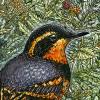

Join BirdNote tomorrow, November 30th!
Illustrator David Sibley and actor H. Jon Benjamin will face off in the bird illustration battle of the century during BirdNote's Year-end Celebration and Auction!
The asteroid that struck the Yucatán 66 million years ago wreaked worldwide ecological damage, spelling the end for most dinosaurs and destroying the world’s forests. Yet a few bird-like dinosaur groups made it through. Scientists believe that these groups were all ground-dwellers. Though some species could fly, a life on the ground would have been a key advantage in a world without forests. All modern birds evolved from these ancient creatures.
BirdNote®
How Birds Survived the Asteroid
Written by Bob Sundstrom
This is BirdNote.
[Southern Cassowary growl]
The asteroid that struck the Yucatán 66 million years ago wreaked worldwide ecological damage. It spelled the end of most dinosaurs and other animals and destroyed the world’s forests.
Yet a few bird-like dinosaur groups made it through. Scientists believe all those groups were ground-dwellers. Most could fly, but being largely terrestrial was a key survival advantage in the absence of trees.
This means that of the 11,000 species of birds that fly the skies, glide over the oceans, and flit among the branches today, all descended from those ancient ground-dwelling bird-like creatures.
[Black-capped Chickadee call]
[Eastern Screech-Owl call]
[Laughing Gull call]
The mass extinction utterly changed life on earth. But as one world ended, another unfolded. A great deal of the world’s present diversity of life emerged following the catastrophic events of 66 million years ago. And many different groups of birds evolved to reclaim a life in the trees. The birds around us today are living proof of nature’s resiliency.
[American Robin song]
For BirdNote, I’m Michael Stein.
###
Senior Producer: John Kessler
Content Director: Allison Wilson
Producer: Mark Bramhill
Associate Producer: Ellen Blackstone
Managing Producer: Conor Gearin
Bird sounds provided by The Macaulay Library of Natural Sounds at the Cornell Lab of Ornithology, Ithaca, New York. Southern Cassowary ML 203983681 recorded by P. Gregory, Black-capped Chickadee ML 202239 recorded by J. McGowan, Eastern Screech-Owl ML 168804731 recorded by W. Hershberger, Laughing Gull ML 174834841 recorded by L. DeMarco, and American Robin ML 346399001 recorded by J. Woods.
BirdNote’s theme was composed and played by Nancy Rumbel and John Kessler.
© 2021 BirdNote December 2021 Narrator: Michael Stein
ID# asteroid-01-2021-12-21 asteroid-01
References:
https://theconversation.com/how-birds-survived-the-dinosaur-killing-ast…
https://www.cell.com/current-biology/fulltext/S0960-9822(18)30534-7?_re…%
https://www.pnas.org/content/114/29/E5864





